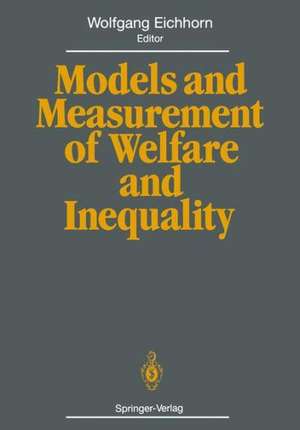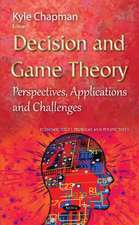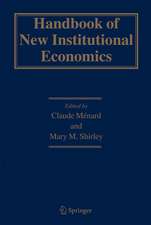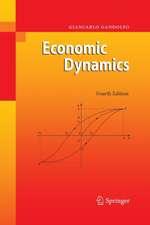Models and Measurement of Welfare and Inequality
Editat de Wolfgang Eichhornen Limba Engleză Paperback – 18 ian 2012
Preț: 683.40 lei
Preț vechi: 804.01 lei
-15% Nou
Puncte Express: 1025
Preț estimativ în valută:
130.77€ • 136.90$ • 108.20£
130.77€ • 136.90$ • 108.20£
Carte tipărită la comandă
Livrare economică 07-21 aprilie
Preluare comenzi: 021 569.72.76
Specificații
ISBN-13: 9783642790393
ISBN-10: 3642790399
Pagini: 1032
Ilustrații: IX, 1018 p. With 102 Falttafeln.
Dimensiuni: 170 x 244 x 54 mm
Greutate: 1.61 kg
Ediția:Softcover reprint of the original 1st ed. 1994
Editura: Springer Berlin, Heidelberg
Colecția Springer
Locul publicării:Berlin, Heidelberg, Germany
ISBN-10: 3642790399
Pagini: 1032
Ilustrații: IX, 1018 p. With 102 Falttafeln.
Dimensiuni: 170 x 244 x 54 mm
Greutate: 1.61 kg
Ediția:Softcover reprint of the original 1st ed. 1994
Editura: Springer Berlin, Heidelberg
Colecția Springer
Locul publicării:Berlin, Heidelberg, Germany
Public țintă
ResearchDescriere
The literature on economic problems connected with measuring and modelling of welfare and inequality has grown rapidly within the last decade. Since this literature is scattered throughout a great number of journals on economics, economic theory, econometrics, and statisties, it is difficult to get an adequate picture of the present state of the art. Therefore books should appear from time to time, which offer a representative cross-section of the latest results of research on: the subject. This book offers such material. It contains 54 articles by 84 authors from four of the five continents. Each paper has been reviewed by two referees. As a conse quence, the contributions of this book are revised versions, or, in many cases, revised revisions of the original papers. The book is divided into four parts. Part I: Measurement of Inequality and Poverty This part contains eleven papers on theory and empirical applications of inequa lity and/or poverty measures. Two contributions deal with, among other things, experimental findings on questions concerning the acceptance of distributional axioms. Part II: Taxation and Redistribution Distributional or, rather, redistributional aspects play an important role in Part II. The topics of the 14 papers included in this part range from tax progressivity and redistribution, allocative consequences of splitting under income taxation, and connections between income tax and cost-of-living indices to merit goods and welfarism as well as to welfare aspects of tax reforms.
Cuprins
I: Measurement of Inequality and Poverty.- Inequality Changes and Income Growth.- Measurement of Income Inequality: Observed Versus True Data.- Income Sufficiency, Expenditures and Subjective Poverty: Results from the United States and The Netherlands.- Acceptance of Distributional Axioms: Experimental Findings.- The Age-Adjusted Inequality Measure of Gini Used to Measure Inequality in Health Care Costs.- A New Compromise Measure of Inequality.- Inequality, Poverty Measurement and Welfare Dominance: An Attempt at Unification.- The Scope of Inequality Coefficients.- Transformations of Stochastic Orderings.- Decomposition of Inequality Measures — Theory and Empirical Application.- On Atkinson’s Index and Consensus in Rankings of Income Distributions.- II: Taxation and Redistribution.- Income Tax and Cost-of-Living Indices.- Risk-Taking Behavior and Inflation Adjustment of Personal Income Taxes.- The Analytics of Splitting under Income Taxation.- Welfare Effects of Abolishing the German Business Taxes — An Applied General Equilibrium Analysis.- Welfare or Pareto-Improving Directions of Piecemeal Tax Reform.- Redistribution Through the Income Tax.- Retrieving Inequality Concepts and Progressivity Objectives from Tax Functions via Approximations.- Merit Goods and Welfarism.- Measurement of Tax Progressivity with Nonconstant Income Distributions.- The Taxation of Married Couples in Germany: Distributive and Allocative Aspects.- Income Equality and Income Taxation.- Income Tax Reform in Germany: A Welfare Analysis.- Income Taxes: The Interaction between Government and Labour Unions.- On the Progressivity of Commodity Taxation.- III: Models and Measurement of Welfare.- On the Use of the Distance Function for Measuring Welfare in Quantity Constrained Regimes.- On Interpersonal Comparison and the Concept of Equality.- Welfare Aspects of Consumption Plans.- Public Budgeting and Social Welfare.- On the Uniqueness of Cardinally Interpreted Utility Functions.- The Measurement of Aggregate Welfare.- The Effect of Relative Price Changes and Cost of Living Adjustments on Some Welfare Indices.- Consumer’s Welfare and Price Uncertainty.- A Reconsideration of Income Compensation Functions in Social Welfare Theory.- EC Integration and the Structure of the Franco-American Airline Industries: Implications for Efficiency and Welfare.- Regulation and Control of Hazardous Wastes: A Welfare-Theoretic Analysis.- Money Metric Measures of Individual and Social Welfare Allowing for Environmental Externalities.- ‘Social Welfare Function’ Measures of Horizontal Inequity.- Commodity Aggregation and Slutsky Asymmetry.- Indices of Welfare for the Economy and Households in Distorted Open Economies.- Resources and Functionings: A New View of Inequality in Australia.- Multidimensional Welfarisms.- Welfare Loss with Intermediate Goods.- Valuing Reductions of Public Risks: The Case of Hazardous Wast.- Harsanyi’s Social Aggregation Theorem with Alternative Pareto Principles.- IV: Models and Measurement Related to Welfare and Inequality.- The Use of Fuzzy Set Techniques in the Context of Welfare Decisions.- Monotonicity and Separability.- Employment Segregation Indices: An Axiomatic Characterization.- Theory and Calculation of Productivity Indexes.- A Model of Interdependent Consumer Behavior: Nonlinear Dynamics in ?2.- An Impossibility Result Concerning Distributive Justice in Axiomatic Bargaining.- Rational Justice and Equality.- Existence and Stability of Equilibrium in a Multisectoral Model with Quantity Rationing.- Efficient Stationary Capital Accumulation Structures of a Biconvex Production Technology.











